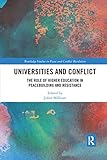Universities and Conflict : The Role of Higher Education in Peacebuilding and Resistance / Edited By Juliet Millican
Contributor(s): Millican, Juliet [editor.].
Publisher: New York : Routledge, 2019Description: 254p.ISBN: 9780367338763.Subject(s): Education, Higher -- Social aspects | Peace-building | Universities and colleges -- Administration | United States | Campus violence -- Prevention | Conflict management | Peace -- Study and teaching (Higher) | Education, Higher -- Aims and objectivesDDC classification: 303.69 Summary: This book uses a series of case studies to examine the roles played by universities during situations of conflict, peacebuilding and resistance. While a body of work dealing with the role of education in conflict does exist, this is almost entirely concerned with compulsory education and schooling. This book, in contrast, highlights and promotes the importance of higher education, and universities in particular, to situations of conflict, peacebuilding and resistance. Using case studies from Europe, Africa, Asia and the Middle East, this volume considers institutional responses, academic responses and student responses, illustrating these in chapters written by those who have had direct experience of these issues. Looking at a university’s tripartite functions (of research, teaching and service) in relation to the different phases or stages of conflict (pre conflict, violence, post conflict and peacebuilding), it draws together some of the key contributions a university might make to situations of instability, resistance and recovery. The book is organised in five sections that deal with conceptual issues, institutional responses, academic-led or discipline-specific responses, teaching or curriculum-led responses and student involvement. Aimed at those working in universities or concerned with conflict recovery and peacebuilding it highlights ways in which universities can be a valuable, if currently neglected, resource. This book will be of much interest to students of peace studies, conflict resolution, education studies and IR in general.| Item type | Current location | Call number | Status | Date due | Barcode |
|---|---|---|---|---|---|
 Books
Books
|
NASSDOC Library | 303.69 UNI- (Browse shelf) | Available | 53618 |
Browsing NASSDOC Library Shelves Close shelf browser

|

|

|

|

|

|

|
||
| 303.69 PSY- Psychology of conflict and conflict management in organizations | 303.69 SAG- Sage handbook of conflict resolution | 303.69 SIM-R Root narrative theory and conflict resolution : | 303.69 UNI- Universities and Conflict : | 303.690954 NEO Negotiating conflict and accommodating identity in South Asia | 303.6954 PEA; Peace and conflict: the south Asian experience | 303.954 SAK-; Confidence building from the sea |
Includes bibliographical references and index.
This book uses a series of case studies to examine the roles played by universities during situations of conflict, peacebuilding and resistance.
While a body of work dealing with the role of education in conflict does exist, this is almost entirely concerned with compulsory education and schooling. This book, in contrast, highlights and promotes the importance of higher education, and universities in particular, to situations of conflict, peacebuilding and resistance. Using case studies from Europe, Africa, Asia and the Middle East, this volume considers institutional responses, academic responses and student responses, illustrating these in chapters written by those who have had direct experience of these issues. Looking at a university’s tripartite functions (of research, teaching and service) in relation to the different phases or stages of conflict (pre conflict, violence, post conflict and peacebuilding), it draws together some of the key contributions a university might make to situations of instability, resistance and recovery. The book is organised in five sections that deal with conceptual issues, institutional responses, academic-led or discipline-specific responses, teaching or curriculum-led responses and student involvement. Aimed at those working in universities or concerned with conflict recovery and peacebuilding it highlights ways in which universities can be a valuable, if currently neglected, resource.
This book will be of much interest to students of peace studies, conflict resolution, education studies and IR in general.
English.


There are no comments for this item.